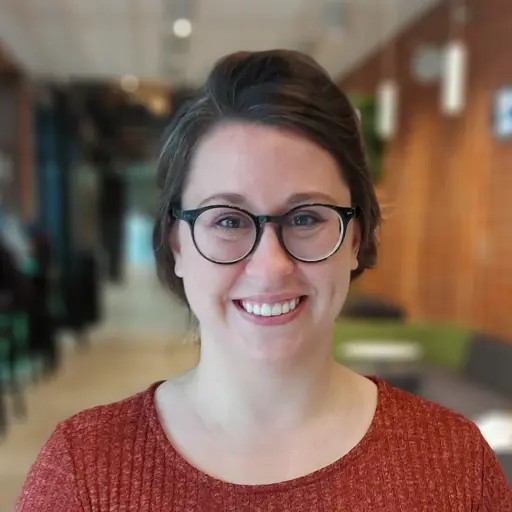
Nano Area of Advance supports different kinds of funding at Chalmers and one example is the undergraduate activity with the ambition to bridge the gap between graduate and undergraduate studies. Angela Grommet, Assistant Professor at the Department of Chemistry and Chemical Engineering, applied for funding for an Amanuenses position for the student Alexandra Jernstedt.

Angela, why did you decide to apply for this funding?
“I have a special interest in giving opportunities to undergraduate students interested in becoming a part of research. This is important to me because this is how I got into the research environment when I was an undergraduate student. I had already Alex in mind when I applied for this funding, she seemed to be very enthusiastic about science and inspired me very much. Alex approached me about the possibility of working in my group, and then we decided to apply,” says Angela.
Angela, what is the project about?
“We make these molecular boxes that we call cages. The cages are made from metal salts and organic molecules. Just like a macroscopic box, you can put things inside these molecular boxes. The project is about moving boxes from one physical location to another physical location, with the intention to be able to separate a mixture of boxes”, Angela explains.

Alex, can you describe your role in the project and what you are studying?
“Right now, I am studying for a Master's in Nanotechnology, and I have a Bachelor's degree in Engineering Physics. My role in the project is to support my supervisor Ebba Matic, but also find new ways to solve problems and provide new perspectives. Since I have a background in Physics, I look at things in a way that is associated with Engineering Physics, rather than how a chemist would look at things,” says Alex.
Angela, how has the collaboration with Alex improved the project?
“So much! As a new Assistant Professor, it has been very important for me to get to publish my first research publication from my own independent group. Alex played a very significant role in getting that project working and completing the project”, says Angela.
Alex, what have you learned so far?
“I learned a lot of chemistry! But also how to work in a lab, which I enjoyed a lot. I don’t have a broad understanding in Chemistry, but I can do basic calculations. It's been very fun when everything comes together! This is a good way for me to be motivated, learning new things and solving new problems”, says Alex.
Alex, how do you see this experience influencing your career path in the future?
“I would like to do a PhD in the future. I like biology and I would like to go into the food industry, maybe creating genetically modified tomatoes? I am very grateful for this experience and for being given a chance. I have realized that research is fun.”
Thank you both for sharing your experiences!
Information about the undergraduate activity
The requirement for this funding is that the proposed activity benefits the contact between the Nano AoA and suitable undergraduate programmes (MSc or BSc). The activities can be diverse and supported up to SEK 100.000. An application can be submitted at any time of the year.
List of undergraduate activities that Nano AoA can provide funding for.
- Internships at Chalmers for Chalmers or other university undergraduate students, both national and international. Note that you can apply for housing support for international master students visiting for an internship for up to maximum 6500 SEK per month.
- Costly BSc or MSc projects
- Amanuenses positions (Typically held by a student or recent graduate who assists in academia and research in a university).
- Possibility to continue a master project after graduation for a short period of time
- Assistant Professor, Chemistry and Biochemistry, Chemistry and Chemical Engineering
